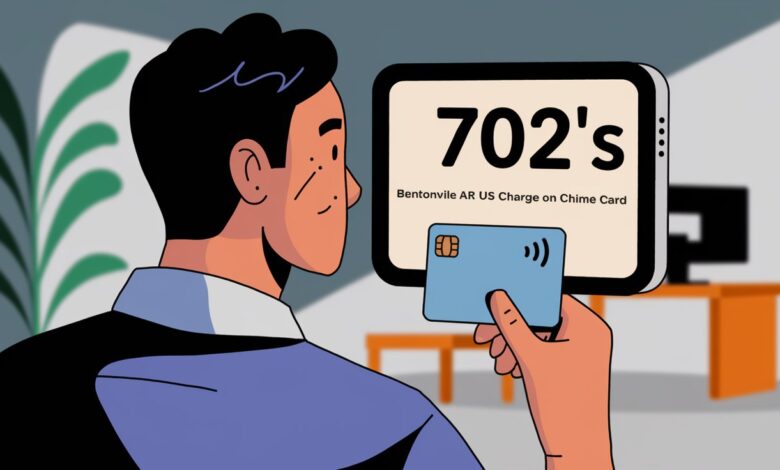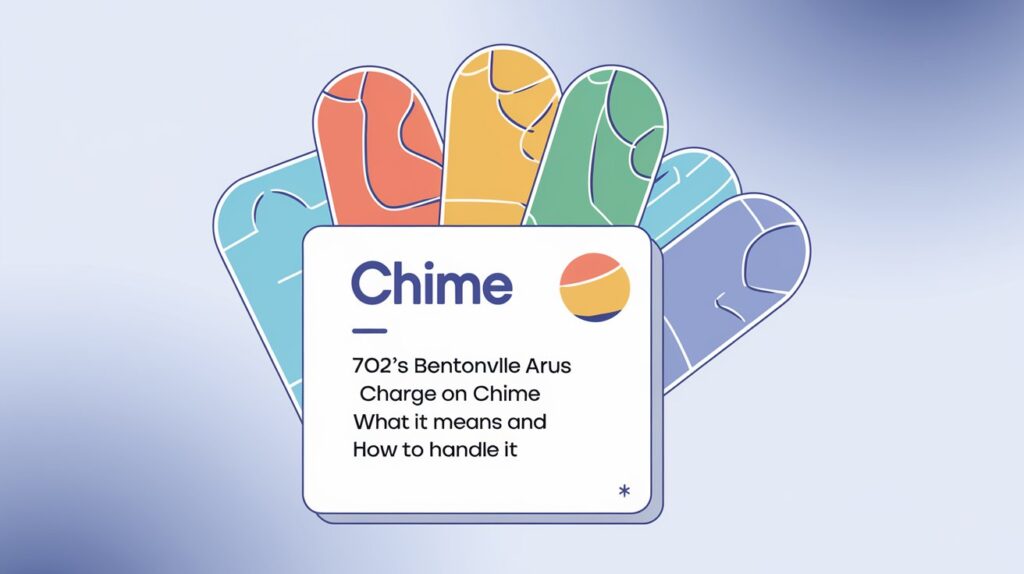702’s Bentonville ARUS Charge on Chime Card Meaning

Have you spotted a mysterious “702’s Bentonville ARUS” charge on your Chime card and wondered what it means? You’re not alone! Many Chime users have reported this charge, sparking concerns about unauthorized transactions or billing errors. In this article, we’ll break down 702’s Bentonville ARUS charge on chime card meaning, possible reasons for its appearance, and steps to take if you didn’t authorize it.
Table of Contents
Understanding the “702 Bentonville ARUS” Charge
What Does the Charge Mean?
The descriptor “702 Bentonville ARUS” on your bank statement typically indicates a transaction processed by Walmart, whose headquarters are located at 702 SW 8th Street, Bentonville, Arkansas, USA. This charge often appears when purchases are made through Walmart’s online platform or app, as transactions are routed through their main office.
Common Sources of This Charge
- Online Purchases: Items bought from Walmart.com or through the Walmart app.
- Subscription Services: Fees for services like Walmart+, the company’s membership program.
- In-Store Purchases: Occasionally, in-store transactions, especially those involving online order pickups, may reflect this descriptor.
It’s important to note that while “702” might suggest an area code, in this context, it refers to Walmart’s headquarters address in Arkansas.
Is This Charge Legitimate or Fraudulent?
To determine the legitimacy of the “702 Bentonville ARUS” charge:
- Review Recent Transactions: Check your purchase history on your Walmart account to see if the charge matches any recent orders.
- Consider Authorized Users: Verify if family members or others with access to your account made a purchase.
- Contact Customer Support: If the charge remains unrecognized, reach out to Walmart’s customer service for clarification.
If you suspect the charge is unauthorized, it’s crucial to contact your bank immediately to dispute the transaction and protect your account from potential fraud.
Please: Beware of Credit Card Fraud – Some Traditional and Modern Techniques Used
Regularly monitoring your bank statements and understanding transaction descriptors can help you manage your finances effectively and identify any unauthorized activities promptly.

Why Did This Charge Appear on Your Chime Card?
Understanding the origin of unexpected charges on your Chime card is crucial for maintaining financial security. The “702 Bentonville ARUS” descriptor often relates to transactions processed by Walmart, headquartered in Bentonville, Arkansas. However, if you’re certain you didn’t authorize such a charge, consider the following possibilities:
Recent Purchases or Subscriptions
- Online or In-Store Purchases: Reflect on any recent shopping at Walmart, either online or in-store. Sometimes, transaction descriptors may not clearly indicate the merchant, leading to confusion.
- Subscription Services: Charges might stem from recurring services like Walmart+, which bills periodically. Review your subscriptions to ensure you’re aware of all active services.
Possible Billing Errors or Duplicate Charges
- Merchant Processing Errors: Occasionally, merchants might accidentally process a payment multiple times or for incorrect amounts. This can result in unexpected charges appearing on your statement.
- Delayed Transactions: Some transactions might not post immediately, leading to charges appearing days after the purchase. This delay can cause confusion, especially if the descriptor isn’t immediately recognizable.
Fraudulent Transactions and Card Security Risks
- Unauthorized Use: If you don’t recall authorizing the charge, it’s possible your card information has been compromised. Fraudsters often use misleading descriptors to mask unauthorized transactions.
- Small Test Charges: Scammers sometimes initiate small charges to test the validity of card information before making larger fraudulent purchases.
Recommended Actions:
- Review Your Transaction History: Check your Chime account for any purchases or subscriptions that match the charge amount and date.
- Contact the Merchant: If the charge is from a recognizable merchant but seems incorrect, reach out to their customer service for clarification.
- Report to Chime: For unrecognized or suspicious charges, immediately contact Chime’s customer support at (844) 244-6363 to report the transaction and protect your account.
- Monitor Account Activity: Regularly review your account statements and set up transaction alerts to stay informed about all account activities.
By staying vigilant and promptly addressing unfamiliar charges, you can safeguard your finances and ensure any discrepancies are resolved swiftly.
Also know: Video KYC-Vital Margin of Successful Banking
How to Dispute an Unauthorized “702 Bentonville ARUS” Charge
If you’ve identified an unfamiliar “702 Bentonville ARUS” charge on your Chime card, it’s essential to act promptly to address the potential unauthorized transaction. Here’s a step-by-step guide to help you through the process:
1. Reviewing Your Chime Account and Transaction History
- Access Your Account: Log in to your Chime mobile app or online account.
- Examine Transactions: Navigate to the “Transactions” section and locate the specific charge labeled “702 Bentonville ARUS.”
- Verify Details: Check the transaction date, amount, and merchant information. Reflect on recent purchases to determine if this charge aligns with any legitimate transactions, such as purchases from Walmart, which is headquartered in Bentonville, Arkansas.
2. Contacting Chime Customer Support
- Immediate Reporting: If the charge remains unrecognized, contact Chime’s customer service without delay.
- Phone: Call Chime at 844-244-6363.
- In-App Support: Use the Chime app to access support by navigating to the “Help” section and selecting “Contact Support.”
- Provide Information: Be prepared to supply details about the disputed charge, including the transaction date, amount, and any other pertinent information.
3. Freezing or Replacing Your Chime Card
- Prevent Further Unauthorized Use: While investigating the charge, it’s prudent to freeze your Chime card to prevent additional unauthorized transactions.
- In-App Card Freeze: Within the Chime app, go to the “Settings” section, select your card, and toggle the “Freeze Card” option.
- Request a New Card: If fraud is confirmed, request a replacement card through Chime customer support to secure your account.
4. Filing a Dispute and Getting Your Money Back
- Initiate a Dispute: After reporting the unauthorized charge, Chime will guide you through the dispute process.
- Dispute Submission: This may involve completing a dispute form within the app or providing a written statement detailing the unauthorized transaction.
- Investigation Process: Chime will investigate the claim, which can take up to 90 days. During this period, they may issue a provisional credit to your account for the disputed amount.
- Resolution Notification: Upon completing the investigation, Chime will inform you of the outcome. If the dispute is resolved in your favor, the provisional credit becomes permanent.
Important Note: Regularly monitoring your account activity and promptly addressing unfamiliar charges are vital steps in protecting your financial well-being.
For more detailed information on disputing charges and understanding Chime’s policies, visit Chime’s official help center.
Do you know: ASKCRED Helps You To Improve Your CIBIL Score
Preventing Unauthorized Charges on Your Chime Card
Safeguarding your Chime card from unauthorized charges involves proactive measures and awareness of potential scams. Implementing the following strategies can help protect your finances:
Enabling Transaction Alerts and Monitoring Spending
- Activate Real-Time Notifications: Chime offers instant transaction alerts, notifying you immediately of any activity on your account. To enable these alerts:
- Open the Chime app.
- Navigate to Settings.
- Tap on Notifications.
- Toggle on Transaction Alerts.
Regular monitoring allows you to detect and address unauthorized transactions promptly.
Using Virtual Cards for Online Purchases
- Enhance Security with Virtual Cards: Virtual cards generate unique, temporary card numbers for online transactions, reducing the risk of fraud. While Chime doesn’t currently offer virtual cards, consider using secure payment services that provide this feature for online purchases.
- Set Spending Limits: Utilize features that allow you to set transaction limits, adding an extra layer of security against unauthorized charges.
Recognizing Common Financial Scams
Awareness of prevalent scam tactics is crucial in protecting your finances:
- Unsolicited Communications: Be cautious of unexpected calls, emails, or messages claiming to be from reputable organizations requesting personal information. Legitimate institutions typically do not ask for sensitive data through these channels.
- Pressure to Act Immediately: Scammers often create a sense of urgency, pressuring you to make quick decisions. Always take the time to verify the legitimacy of the request.
- Requests for Unusual Payment Methods: Be wary of demands for payment via gift cards, wire transfers, or cryptocurrency, as these are common red flags for fraudulent schemes.
Additional Tips:
- Regular Account Reviews: Frequently review your bank statements and account activity to spot and report unauthorized transactions swiftly.
- Secure Personal Information: Avoid sharing sensitive data unless you are certain of the recipient’s legitimacy.
- Stay Informed: Keep abreast of common scams and fraud tactics to enhance your ability to recognize and avoid them.
By implementing these measures and maintaining vigilance, you can significantly reduce the risk of unauthorized charges and protect your financial well-being.
Conclusion:
Finding an unfamiliar 702’s Bentonville ARUS charge on your Chime card can be unsettling, but there are steps you can take to verify its legitimacy and protect your finances. Whether it’s a legitimate transaction or potential fraud, reviewing your account, contacting Chime, and disputing the charge if necessary will help ensure your money stays safe. Stay vigilant and monitor your transactions regularly to avoid financial surprises!
Frequently Asked Questions (FAQs)
Is the “702 S Bentonville ARUS” charge linked to Walmart?
Yes, the “702 S Bentonville ARUS” charge typically indicates a transaction processed by Walmart, as their headquarters are located at 702 SW 8th Street, Bentonville, Arkansas.
How long does it take to get a refund for a disputed charge?
After a merchant issues a refund, it usually takes up to five business days for the money to appear in your Chime account.
Can I prevent these charges from happening in the future?
To prevent unauthorized charges, regularly monitor your account activity, enable transaction alerts, and use secure payment methods. For online purchases, consider using virtual cards or trusted payment services to enhance security.
What should I do if I suspect my Chime account has been compromised?
If you suspect unauthorized activity on your Chime account, immediately contact Chime customer support at (844) 244-6363, freeze your card through the Chime app, and review your recent transactions for unfamiliar charges.
What is the process for disputing a charge on my Chime card?
To dispute a charge, log into the Chime app, select the transaction in question, tap “Problem with this transaction?” and follow the prompts. Chime will investigate the dispute, which may take up to 90 days. If the investigation isn’t resolved within 10 business days, a temporary credit may be applied to your account.
Are there any fees associated with disputing a charge on my Chime card?
No, Chime does not charge any fees for disputing a transaction on your account. For more detailed information, refer to Chime’s official help center or contact their customer support directly.
Comments
0 comments




